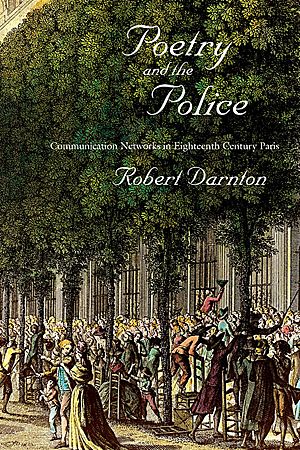In college, if someone had told me there was a point in history when a group of people got into trouble for reciting poetry, I would have asked to see a copy of the poem or poems in question and began looking for small hand drawn pictures of breasts on them, certain as I would have been, sitting in class, attempting to convince the girls that Gwendolyn Brook's poem "We Real Cool" was about living every day like it's your last and, if you're smart, finding someone quickly to have sex with, that whatever the offense, it must have had much less to do with malleable and, frankly, ungrammatical language than meets the ear.
It's hard to imagine, isn't it? Not the cartoon breasts, but a world in which poetry, an art form capable of losing the collective interest of approximately 37.8 million people, could incite such prompt and adamant response from government authorities? Of course, Robert Darnton doesn't set his sights outside of Paris in Poetry and the Police, in the spring of 1749; a time and place a great deal easier and more fun to summarize in hindsight of European and American history if not itself quite on the brink of revolution.
That said, if my college self was on the case, rather than Paris' minister of war, d'Argenson, the police would have spent a good deal more time getting high and frantically copying down each other's math homework than getting to the bottom of things, or rather, the top, as each of the five poems attended to and confiscated contained language, however flowery, furtively or flagrantly in opposition to his highness and his highnesses' associates (and I don't just mean those "metaphors" that often times confuse the hell out of everything by not playing the game and using "like" or "as" in their comparisons of two otherwise pretty obviously different things like everybody else).
 |
| The Department of Justice tweeting the word "BOOR-ing" to its followers during Elizabeth Alexander's reading of "Praise Song for the Day" |
You see, "l"Affaire des Quatorze," or "The Affair of the Fourteen," as it came to be known, seemingly involved the dissemination of seditious verse about King Louis XV, less through the streets than down the halls of the professional bourgeois. Collars, doctors, lawyers, profs, and students of all of the above were corralled like small children promised candy inside dark, fast moving carriages and detained until they either admitted authorship or ratted out someone who would. The problem was that no one could. While everyone knew when, where, or from whom they'd heard, repeated or laid eyes on the poems, no one evidently knew a thing about their origins. (This, by the way, is just one of innumerable examples Darnton simultaneously teases and enlightens with of how much pre-revolutionary communication networks in France were and are like Pinterest.) Darnton's impeccably researched and still incomplete diagram of how d'Argenson's suspects were identified and dismissed is both comical and hard to watch, like a chain of stilted dominoes variously eye-browing the 6 behind them to authorities and altruistically not moving one voluntary inch, or apparently leaving anything to the imagination. Ironically, Darnton's meticulous work here comes off like a boisterous round of Telephone meets Hot Potato until one considers that the same fathers and sons who knew next to nothing about where these poems came from knew as much about who of their families, friends, and colleagues was and wasn't telling lies, or "telling it slant," as we say on "the force," or, you know, my third-Thursdays bimonthly poetry workshop. The truth then, burrowed as it often is, is also much more interesting. And what's even funnier is how it came about.
King Louis XV, turns out, was like a child who stops playing tag because "it's dumb" the moment that he's "it,"less intolerant of dissenting verse in general than that which hurled its stones toward him. Since the 15th century, in fact, the king enjoyed the songs and poems, written by his courtiers, that brought the gossip of the high-court and jokes about prostitutes to his footstool, in the palace of Versailles. The first of the five poems pegged on "the fourteen," "The Exile of M. de Maurepas" was, for instance, almost certainly composed by someone with specific, in-house information regarding the dethroning of d"Argenson's predecessor. His offense? The writing of a lude poem about none other than the king's mistress (or one of his mistresses), inspired by an otherwise intimate gathering, in which de Maurepas compared (with words that look like "like" and "as" in French to me) the woman to a whore who's always bleeding, or something like that. Slam! As a friend of mine said recently, don't put anything on FaceBook that you wouldn't put on your mother. I mean, put on in front of your mother. I mean... you know what I mean. Same apparently goes for 18th century royal dinner parties.
But even such unflattering intimacies were not enough to make it empirically clear to those wrongly accused that none of them could be responsible. No, what made it so were not the details, nor the politics or provocations, but what the majority of these men considered to be bad writing. Ha! It's like a reader dropping Fifty Shades of Grey out of disgust not with the masochistic sex scenes but the run on sentences. Like a teaching saying, "Never mind your total misreading of Marxism. What's the deal with all these present continuous tense verb endings?" And for any reader, it's a wondrous, enlightening reminder of what distinguishes power from control.


No comments:
Post a Comment